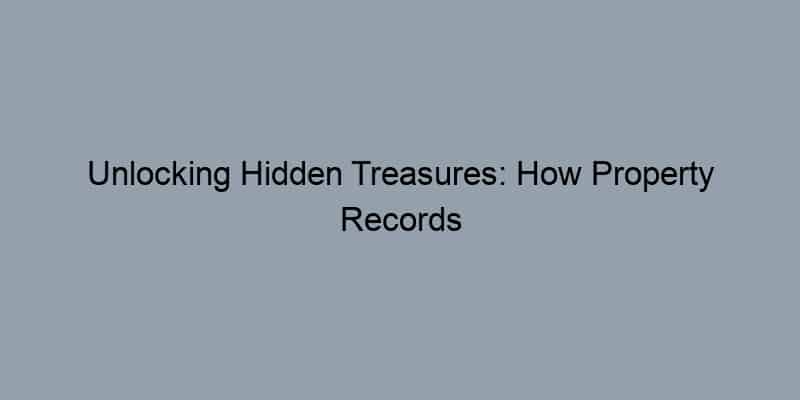When you think about buying or selling a home, what comes to mind? You might imagine finding the perfect kitchen or a beautiful backyard. But what if I told you there’s something even more valuable lurking beneath the surface? It’s called property records. In this article, we’ll explore why these records are essential for home buyers, sellers, and real estate professionals. So, let’s unlock the treasures hidden in these documents!
Why Are Property Records Important?
Imagine you’re about to purchase your dream home. It looks perfect on the outside, but you have no idea what’s hidden in its past. That’s where property records come into play. These documents provide valuable insights about a property, which can either save you a lot of headaches or help you secure the very best deal.
What Are Property Records?
Property records are official documents that contain summaries of various details about a property. These can include:
- Ownership history: Who owned it and for how long?
- Sales history: How much it sold for in the past?
- Mortgages and liens: Are there any outstanding debts on the property?
- Tax records: How much are the property taxes?
- Zoning information: What can the property be used for?
By diving into these details, you can make more informed decisions, whether you’re buying, selling, or representing a client in the real estate market.
Why You Need a Comprehensive Property Record
Understanding the importance of a comprehensive property record can help you avoid pitfalls and seize opportunities. Here are the key areas where having this information can make a significant difference:
1. Finding Home Values
A comprehensive property record shows you the past sales prices of the home and similar homes in the area. This is important for home buyers because it helps them determine whether a property’s asking price is fair or inflated. For sellers, knowing the market value can help set a competitive price to attract buyers.
Example: Imagine a home is listed for $300,000. However, the property record indicates that similar homes in the neighborhood typically sell for around $250,000. This information allows buyers to negotiate a better deal and makes sellers think twice about their asking price.
2. Sales History
The sales history reveals whether a property has changed hands frequently or stayed with the same owner for a long time. Frequent turnover might raise a red flag about the home’s condition or the neighborhood.
Example: If a house has changed owners multiple times in the last few years, potential buyers might want to delve deeper and investigate why, perhaps steering clear of possible problems.
3. Tax Records
Property records include tax information, letting buyers and sellers know what to expect in terms of property taxes. This is crucial because property taxes can vary significantly from one area to another, affecting the overall cost of homeownership.
Example: A buyer interested in a property may find that a house has extremely low taxes, making it more attractive and affordable over time.
4. Mortgages and Liens
Property records provide important insights into any outstanding mortgages or liens on the property. This helps buyers avoid potential financial surprises should they move forward with a purchase.
Example: If a property record shows a lien due to unpaid contractor bills, the new owner may need to settle that debt before they can fully own the home.
5. Homeowner Information
Having access to homeowner information enables you to learn about the current owner. This could help in negotiations, especially if the owner is eager to sell.
Example: If a seller has been in the home for many years and is looking to downsize, knowing their motivations can help buyers make an appealing offer.
Key Information
Here’s a summary of the most important takeaways:
- Property records reveal crucial insights about a property’s value, history, and financial obligations.
- Understanding sales history can inform your negotiating strategy for buying or selling a home.
- Tax records help estimate ongoing costs beyond just the home price.
- Mortgages and liens information can prevent unexpected financial burdens.
- Homeowner information allows for strategic negotiating based on the seller’s motivations.
FAQs About Property Records
1. What is included in a property record?
A property record typically includes ownership history, sales history, tax records, mortgages and liens, and zoning information. It gives you a comprehensive view of the property.
2. How do I access property records?
Property records can often be accessed online through county offices, real estate websites, or specialized services like OfficialPropertyRecords.org, which provides detailed reports.
3. Why should I care about tax records?
Knowing the property taxes helps you understand your future financial responsibilities. It can significantly impact your monthly budget and overall homeownership experience.
4. Can property records help in negotiations?
Yes! Understanding a property’s sale history and homeowner situation can give you leverage during negotiations—whether you’re buying or selling.
5. How can I ensure I’m getting a comprehensive property record?
Look for services that offer detailed insights and have a good reputation, like OfficialPropertyRecords.org. They provide extensive reports that cover all your needs.
Conclusion
As you can see, property records are more than just paperwork; they’re a treasure trove of information that can guide home buyers, sellers, and real estate professionals alike. These documents can help you assess property values, uncover financial obligations, and even give you negotiation power.
Whether you’re interested in buying your dream home, preparing to sell, or working as a realtor, investing time in understanding property records is well worth it. We recommend getting your comprehensive property records from OfficialPropertyRecords.org to navigate your real estate journey with confidence. By unlocking these hidden treasures, you could very well find your real estate goldmine!

